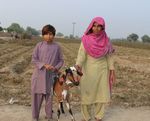LIVESTOCK GIFTS 2016 SUSTAINABLE PROGRAM REPORT - Penny Appeal USA
←
→
Page content transcription
If your browser does not render page correctly, please read the page content below
Address: Dear Friend,
717 King St, Suite 200
Thank you for your wonderful donation to our livelihood program.
Alexandria, VA 22314
We’re delighted to let you know that our goat distribution has now
Phone:
been completed and we’ve enclosed a feedback report, which shows
+1 (202) 851-2112
pictures of your sustainable livestock gift and how many people are
Website: benefiting from it.
pennyappealusa.org
I do hope you’ll share this fantastic work with your family and friends,
Email: and I hope the report inspires them and yourself to continue to
info@pennyappealusa.org support our sustainable livestock program.
Yours Sincerely,
Follow us
@pennyappealUSA
OUSSAMA MEZOUI
Penny Appeal USA President & CEO
Share your most
cherished moments
with new friends.
Sharing your special occasions
can help make a difference. Visit
pausa.org/celebration and
pledge your birthday, wedding,
or anniversary for a cause you’re
passionate about.
PENNY APPEAL USA is a
recognized 501(c)(3) nonprofit.
All donations are tax-deductible.
EIN/Tax ID: #47-5165837PENNYAPPEALUSA.ORG
202.851.2112
PROJECT OVERVIEW & OBJECTIVES
Why Goats?
Since goats require less space and feed than cattle, they can be owned even by
Food the landless. Goats demonstrate significant return on investment by providing
milk, meat, manure, cash, savings and status. Families living in poverty are more
likely to own goats rather than cattle. Therefore, support for goat-keeping can
be a valuable entry point into the sort of income generation that chips away at
Wool poverty.
Goat projects can advance all Sustainable Development Goals, especially the
eradication of extreme poverty and hunger. Goat ownership can also help
empower women while building men’s support for increased opportunities for
Business & their wives and daughters in commercial goat business.
Cash Income
Goats are a key to
ending cyclical poverty
Families benefit from
having a goat, which helps
generate cash income and
improve overall household
nutrition.
Villages and communities
establish financial and
economic security through
livestock-related business.
Global and cyclical poverty
start declining as world
hunger decreases and focus
turns to empowerment,
Ulfat Bibi and Family education, and equality.PENNYAPPEALUSA.ORG
202.851.2112
PROJECT OVERVIEW & OBJECTIVES
What is the impact?
Women and children play an active role in
livestock production. Children help in various
chores while women carry out feeding,
cleaning and milking. Men haul fodder (goat
food) and women help in chopping. The sale
of their goat byproducts can sustain a family
so that they may meet their basic needs and
begin to climb out of poverty.
Who benefited?
The program provided support to 80 rural
women whose families suffered the greatest
Penny Appeal on the ground
forms of poverty within their villages.
The selection process prioritized the families
with the most need within the villages that
also had the capacity to sustain and act on the Total Beneficiaries:
348
livestock ownership responsibilities.
Women Children Men
80 217 51
Anwar Bibi and FamilyPENNYAPPEALUSA.ORG
202.851.2112
ACTIVITIES
Community Involvement
Location: 13 villages of Vehari District, Pakistan
Community ownership was maintained throughout the duration of the program. This was established through
involvement by village leaders, local organizations, local government, and local activists. Recipient families
were selected by village leaders familiar with the needs and conditions of all members of their community and
were cross-checked by our local team.
A sustainability workshop was organized for all project staff and local actors where record keeping tactics,
monitoring and evaluation methods, and ethical practices were reviewed.
Family Training
Families received an intensive entrepreneurial and goat management training prior to the distribution. The
training included:
• Information on common diseases carried by goats
• Curative and preventative measures to avoid illnesses
• Breeding and nutritional improvement
• Fair market values of goat byproducts
• Overview of the long-term profitability of one or more goats
Goat Distribution
Upon receiving the proper vaccinations and a clean bill of health from a local veterinarian, the goats were
distributed to their designated families. As part of the monitoring and evaluation process, all families were
linked to the relevant departments for regular livestock vaccinations. All goats were delivered to families in
either the last stages of pregnancy or with their newly-born offspring.PENNYAPPEALUSA.ORG
202.851.2112
CASE STUDY & PHOTOS
Kalsoom Bibi and Ansar Bibi
are each a recipient of one
pregnant goat. Within 15 days
of the distribution, the goats
birthed an offspring.
When asked what impact these
goats have on the livelihood of
their families, they responded:
“Our children are able to
drink milk twice a day and
will stay healthy. It is a sigh
of relief for our family to
know that we can start
over a new life now.”
Kalsoom Bibi with her 2 livestock Gifts
Gulzar Bibi & Family Nazeeran & FamilyYou can also read
























































